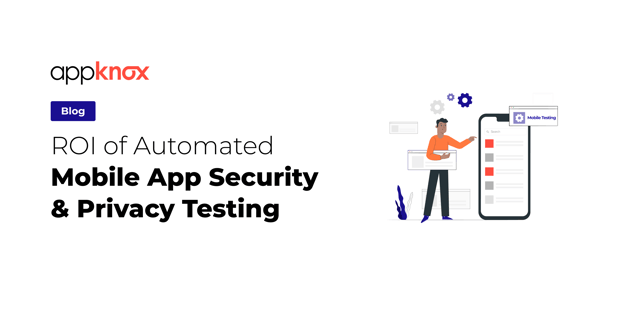
BLOG

BLOG
Several companies aren't still aware of the fact that automated mobile app security brings better ROI than manual testing. Perhaps, they don't know what aspects of security testing automation directly or indirectly impact the ROI. However, we got you covered.
This blog discusses three almost hidden ways in which automation testing impacts and holds the potential to improve your ROI. And by the end, you'll be convinced to transition to complete automation testing.
Here's how:
Compared to manual testing, automation testing is way more affordable.
Let's understand this with an example.
On average, a security analyst makes around $100,000 yearly ($103,590, to be precise). Because it takes approximately two weeks to complete one penetration test, your security analyst can perform about 24 tests yearly. And this brings the cost of one test to around $4100 ($100,000/24.)
Where a manual pen test takes around two weeks, automated mobile application security testing could be completed within one day. And the quality & scope of the test would be way better compared to the manual one.
So, doing the math, if you can get 1 test done each day, you can perform around 240 tests each year. Now, at the same $100,000 salary, the cost per test comes down to just ($100,000/240) $410, which is a ten times productivity increase and a ten times cost reduction.
Even if you outsource penetration testing, a single test would cost you between $10,000-$30,000, which is still way more expensive than opting for automation testing.
Verdict:
ROI is = Net income / Cost of investment x 100
So, your ROI automatically increases when your investment cost reduces by ten times, as per the above example. Even if the price of investment reduces by two times, the ROI of automation testing is still better than manual testing.
As stated earlier, a manual penetration test takes about two weeks. This 2-week period is a pretty long time for developers to retain all the code they wrote. While the app is being tested, your developers may progress with the app by writing new code.
When the results finally arrive, the developers must go through the entire code and understand it thoroughly to fix the reported bugs. Therefore, it will take longer to fix the bugs and then deploy the build, which translates to a delay in the release of your application.
However, mobile application security testing automation can reduce the testing time from 2 weeks to 3-4 days or even one day in some cases.
As it takes less time for test results to arrive, developers still have a connection with the code they wrote, and they can fix bugs more quickly, perhaps within 2-3 days. And this way, you can push the app more rapidly into the market.
In a nutshell, application security testing automation helps reduce the overall time and effort spent on fixing bugs, saving you money. Also, releasing an app quickly gives you a competitive advantage, saving you the cost of missing market opportunities.
While manual testing has to wait for the app development to complete, automated mobile app security testing can be performed parallel to app development. This way, you can find and resolve bugs early in the SDLC lifecycle and potentially save money.
For instance, according to IBM, it costs 15X times to fix the bugs found in the testing phase compared to the design phase. This proves bugs detected early are less expensive to fix than the ones found at later stages.
Please Note: You may think that introducing security testing early in the SDLC is DevSecOps. Yes, that's true, but, DevSecOps practice is usually manual. And although you may find bugs in the early stages, manual testing will still take a lot of time to detect those bugs.
However, automation testing helps you report the bugs at early stages, requiring way less time and effort than manual testing. And as reporting bugs quickly and at earlier stages saves time and money, your ROI automatically soars higher.
Security testing for a mobile application involves different processes that check the app/code for vulnerabilities to make the application secure and resilient to hackers. A typical example is penetration testing, wherein the testers try to attack the app just like hackers would do and fix vulnerabilities if found.
The best way to ensure mobile app security is to opt for automated mobile app security. Just perform automated penetration tests and vulnerability assessments as frequently as possible and fix whatever loopholes are found. This way, you can ensure mobile app security.
Security testing automation or automated mobile application security testing involves using tools or software to test the mobile app and find and report bugs. Automation testing is considered more accurate and scalable than manual testing.
Automated mobile app security testing is not a new concept. It's been there for years. However, it's only recently that companies have started understanding its true importance and ability to boost your ROI. So, if you haven't yet integrated automation testing, this is the right time.
Reach out to Appknox, Gartner's preferred and highest-rated automated mobile application security testing expert, and select the tools that suit your needs. Integrate them in your SDLC and experience better ROI than ever.
.jpg?width=50&height=50&name=10606600_10204086667262761_7381430219125488912_n%20(1).jpg)
Hackers never rest. Neither should your security!
Stay ahead of emerging threats, vulnerabilities, and best practices in mobile app security—delivered straight to your inbox.
![]() Exclusive insights. Zero fluff. Absolute security.
Exclusive insights. Zero fluff. Absolute security.
![]() Join the Appknox Security Insider Newsletter!
Join the Appknox Security Insider Newsletter!
